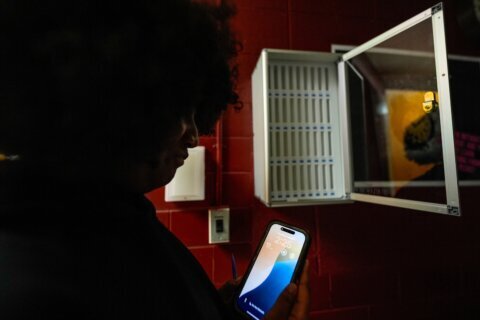The food may be delicious, and the decorations wonderous, but a bustling holiday feast with family and friends can leave a person who has hearing loss with a bad taste in their mouth.
“Dinner table syndrome” occurs when a person with hearing loss feels isolated as table-mates share stories, questions, and answers across the holiday table.
“It’s difficult for people with hearing loss to follow when there’s multiple conversations going on,” said Jared Marcotte, a licensed hearing instrument specialist at HearUSA in Fairfax, Virginia. “And you know conversations can organically shift from one area to another.”
“If you have hearing loss and someone’s talking from your left, and then all of a sudden someone’s talking from your right, it can be hard to follow,” said Marcotte.
In time, a person having difficulty following a conversation, even in a family atmosphere, can become socially isolated.
“You would think it’s easier to communicate with your family, right?” Marcotte said. “You’d think they’d be more conscientious, but that’s not always the case.”
For a person who grew up being able to hear well at family gatherings, the struggle can be unsettling.
“Hearing and communication takes a lot more processing power than most people realize,” said Marcotte. “You have to take into account lip reading, syntax, and the context of sentences in the conversation — that all comes into play.”
Hints to keep up with the conversation
It’s likely one or more guests at an upcoming family holiday gathering will have some degree of hearing loss.
“One in 10 people aged 55 to 65 have a disabling hearing loss,” said Marcotte, and the percentages increase as a person ages. “The problem is [only] 1 in 8 people do something about it.”
For the person struggling to hear: “Point your nose to where you want to hear,” said Marcotte. “So try and hear with your nose, or listen with your nose.”
Others at the table may not be aware of a person’s hearing loss — and that person may not feel comfortable asking others to speak more slowly, loudly, or clearly.
“There’s always been a negative stigma to hearing loss, and so that makes it difficult for patients to make that sort of declaration: ‘I have hearing loss,'” said Marcotte.
However, Marcotte said conscientious family and friends are usually glad to help keep everyone involved in the conversation.
One tip: “Grabbing your significant other or family member’s attention if they have hearing loss, before talking to them, so that way they can tune-in on what’s being said.”
Another suggestion? “Try to face them when you’re speaking, so they can use all those communication strategies to their advantage, like lip reading, facial gestures, and hand gestures.”
Hearing aids can help on a more permanent basis, since a professional can program them around the person’s hearing deficits.
“They’re not just a general amplifier — they help improve speech clarity and communication,” said Marcotte. “They help you remain part of the conversation.”
Editor’s note: Clarifies Marcotte’s title.








